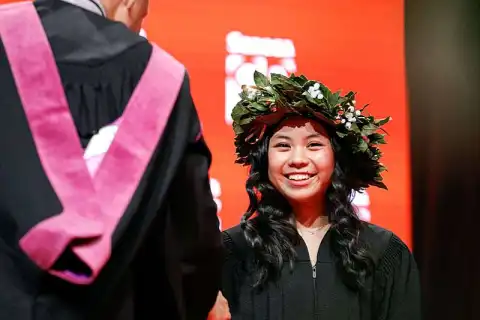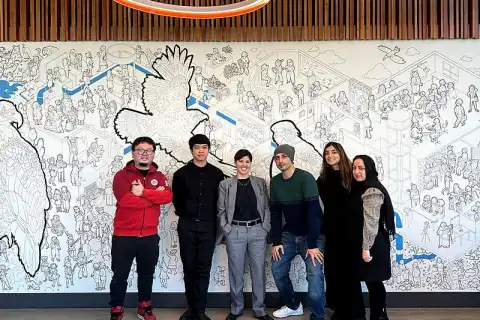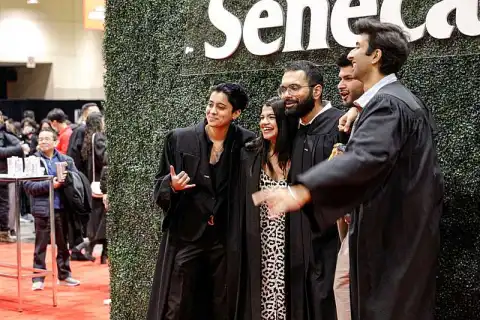Bachelor (Hons) - Child Development
- 4 years
- Duration
- 20,117 CAD/year
- Price
- Rolling admission
- Start
- Rolling admission
- Deadline
- Bachelor
- Degree
- Mixed
- Format
- Toronto / Canada
- Location
Program description
Opportunities in the health, education, and social service fields are vast, and you can prepare for them by completing the four-year Honours Bachelor of Child Development degree program.
You will be prepared for work in fields like child and adolescent mental health, infant mental health, early learning and education, recreation, and family support services. You'll meet the requirements to become a RECE (Registered Early Childhood Educator) and a member of the College of Early Childhood Educators.
Skills
Throughout this program you will develop the following skills:
- Leadership
- Communication
- Interdisciplinary educational approaches
- Interprofessional collaboration
Program structure
Semester 1
- Healthy Environments: Health, Safety and Nutrition
- Human Development and Observation: Conception to Toddlerhood
- Foundations of Teaching and Learning
- Professional Practice in a Diverse Culture
- Writing Strategies
Semester 2
- Integrative Seminar: Preschool Placement
- Human Development and Observation: Preschool to School Age
- Art and Science to Explore the Natural World
- Ethics, Policy and Legislation
- plus: Liberal Studies Course
Semester 3
- Integrative Seminar: Infant and Toddler Placement
- Children with Diverse Abilities
- Physical Literacy and Music
- Developing and Sustaining Partnership with Families
- plus: Liberal Studies Course
Semester 4
- Integrative Seminar: Kindergarten to Grade 3 Placement
- Attachment Across the Lifespan
- Mathematics and Digital Literacy
- Child and Family Relationships: Theoretical Foundations
- Critical Social Theories
Semester 5
- Integrative Seminar: Community Placement
- Mental Health Intervention Planning for Children
- Children's Emotional Well-Being
- Interprofessional Collaboration
- Indigenous Awareness: Towards Truth and Reconciliation
Semester 6
- Work Term Preparation
- Brain Research and Cognitive Development
- Introduction to Research Methods
- Care Collaboration with Families
- Language Development
- plus: Liberal Studies Course
Work-Integrated Learning Term
- Childhood Development, Work Term
Semester 7
- Effects of Stress, Trauma and Violence on Children's Learning
- Applied Research Proposal
- Methods of Screening and Assessment
- Childhood in Global Contexts
- plus: Liberal Studies Course
Semester 8
- Transformative Learning in Communities
- Applied Research Paper
- Family Focused Practice: Early Intervention
- plus: Liberal Studies Course
Price
Tuition fees - 20,117 CAD/year
Books and Supply Costs - 1,120 CAD
Please note: All costs are approximate, may vary by campus and are subject to change at any time without notice.
Requirements for applicants
Academic Requirements:
- High school transcripts for grades 10, 11 and 12 showing all program specific pre-requisite courses.
- Transcripts must include six (6) senior level courses equivalent to Ontario university preparatory credits with an overall average of 65%.
- High school/secondary school diploma (certificate of completion).
- You may submit transcripts or certificates for any completed university/postsecondary college courses or programs taken inside or outside of Canada.
- Academic records that are in a language other than English must include an official/certified English translation.
Seneca reserves the right to verify submitted transcripts at any time. For courses and credentials earned inside of Canada, Seneca reserves the right to request original transcripts be sent directly to Seneca from the issuing institution. Applicants will be notified if this is needed.
English Proficiency Requirements:
If English is not your first language, show one of the following:
- Minimum of two years full-time study in an English-speaking nation
- Minimum one year of full-time postsecondary education in an English-speaking nation
- Successful completion of an intense English program like the English Language Institute
- English proficiency exam results from one of the international testing agencies. Only two-year-old tests are valid.
English language test score requirements
- CAEL CE and CAEL online - Minimum 70 (Writing no less than 60)
- Cambridge English Exams (B2 First/FCE, C1 Advanced/CAE or C2 Proficiency/CPE) - Minimum 176 with no skill below 169
- Duolingo - Minimum score 115 to 120
- IELTS Academic - Minimum 6.5 with no skill below 6.0
- PTE Academic - Minimum score 60
- TOEFL iBT (including MyBest TOEFL and Home Edition) - Minimum 84 with no skill below 21
- TOEFL Revised Paper Delivered - No skill below 21
About the university

A public institution with many campuses in Peterborough, Ontario, and the Greater Toronto Area is called Seneca College of Applied Arts and Technology. At the bachelor, diploma, certificate, and graduate levels, it provides both full-time and part-time programs.
Seneca has been involved in foreign education for many years and today draws over 10,000 students from over 130 different nations each year. Through intense language instruction that may last anywhere from two months to more than a year, Seneca's English Language Institute helps overseas students become ready for post-secondary education. The college has a number of alliances with schools abroad and is growing its efforts in collaborative applied research and work/study abroad opportunities.
Seneca in a Nutshell
- With 30,000 full-time students and more than 70,000 registrations for continuing education each year, this institution is among the biggest in Canada.
- 7,000 foreign students from more than 150 nations make up a diversified student body.
- In terms of connections to other postsecondary institutions, Ontario colleges rank first.
- In Toronto, York Region, and Peterborough, there are ten campuses.
- Every year, on average, 8,000 bursaries and 2,600 Seneca scholarships/awards are given out.





